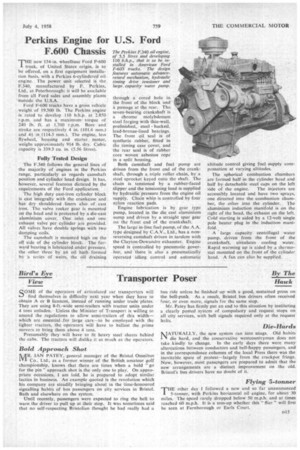Transporter Poser
Page 61

If you've noticed an error in this article please click here to report it so we can fix it.
By The Hawk
QOME of the operators of articulated car, transporters will 1.-) find themselves in difficulty next year when they have to obtain A or B licences, instead of running under trade plates. They are using 8-ft.-wide semi-trailers with tractor units under 4 tons unladen. Unless the Minister of Transport is willing to amend the regulations to allow semi-trailers of this width— which are essential for large cars—to be emoloyed with the lighter tractors, the operators will have to ballast the prime movers to bring them above 4 tons.
Presumably they will have to fit heavy steel sheets behind the cahs. The tractors will dislike it as much as the operators.
Bold Approach Shot
IVIR. IAN PATEY, general manager of the Bristol Omnibus
Co., Ltd., as a former winner of the British amateur golf championship, knows that there are times when a bold "go for the pin" approach shot is the only one to play. On appropriate oCcasions, I am told, he is prepared to adopt similar tactics in business. An example quoted is the revolution which his company are steadily bringing about in the time-honoured signalling habits of bus passengers on city services in Bristol, Bath and elsewhere on the system.
Until recently, passengers were expected to ring the bell to warn the driver to pull up at their stop. It was sometimes said that no self-respecting Bristolian thought he had really had a
bus ride unless he finished up with a good, sustained press on the bell-push. As a result, Bristol bus drivers often received four, or ever, more, signals for the same stop.
Mr. Patey has firmly put an end to this situation by instituting a clearly posted syStem of compulsory and request stops on all city services, with bell signals required only at the request halts.
Die-Hards
mATURALLY, the new system ran into snags. Old habits
die hard, and the conservative westcountryman does not take kindly to change. In the early days there were many altercations between conductors and bell-happy passengers, and in the correspondence columns of the local Press there was the inevitable spate of protest—largely from the crackpot fringe. Now, however, most passengers are prepared to admit that the new arrangements are a distinct improvement on the old. Bristol's bus drivers have no doubt of it.
Flying 5-tanner
THE other day I followed a new and so far unannounced I 5-tanner, with Perkins horizontal oil engine, for about 30 miles. The speed rarely dropped below 50 m.p.h. and at times reached 60 m.p.h. it is a toss-up whether this " flier " will first be seen at Farnborough or Earls Court.




























































































































